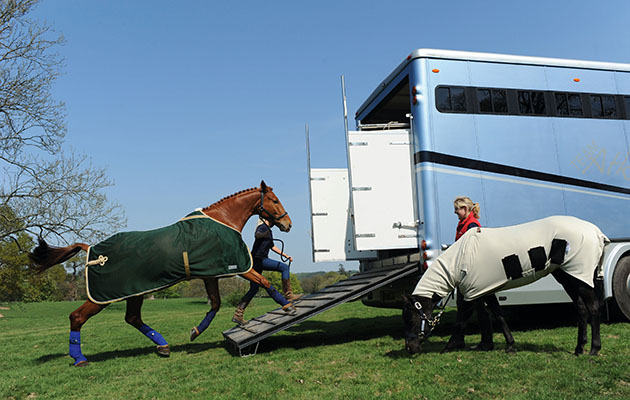As rumours about how the crisis will impact on equine insurance claims circulate online, H&H asks a number of insurance professionals for their expert assessment of the situation...
Equestrians are encouraged to talk to their insurers and avoid listening to hearsay during the coronavirus pandemic.
As rumours spread online, insurers have assured clients they will consider cases carefully – and that they are there for guidance and advice, including on how premiums could be reduced.
{"content":"PHA+QSBzcG9rZXNtYW4gZm9yIFNFSUIgSW5zdXJhbmNlIEJyb2tlcnMgdG9sZCA8ZW0+SCZhbXA7SDwvZW0+IGNvbW11bmljYXRpb24gaXMga2V5IGluIHRoZXNlIHVucHJlY2VkZW50ZWQgY2lyY3Vtc3RhbmNlcy48L3A+CjxwPuKAnFRhbGsgdG8geW91ciBpbnN1cmVyIGFuZCBrZWVwIHRoZW0gaW5mb3JtZWQgb2YgYW55IHJlbGV2YW50IGNoYW5nZXMgdG8gY2lyY3Vtc3RhbmNlcyBhdCBldmVyeSBzdGFnZSzigJ0gc2hlIHNhaWQuIOKAnFNFSUIgaXMgY29udGludWluZyB0byBzZXJ2aWNlIG91ciBjbGllbnRzIGFuZCBpcyBpbiBjb25zdGFudCBjb21tdW5pY2F0aW9uIHdpdGggb3VyIGluc3VyZXJzLuKAnTwvcD4KPHA+Q2xpZW50cyBoYXZlIHJhaXNlZCBxdWVzdGlvbnMgc3VjaCBhcyB0byB3aGV0aGVyIHRoZSAxMi1tb250aCB3aW5kb3cgaW4gd2hpY2ggdG8gY2xhaW0gY291bGQgYmUgZXh0ZW5kZWQgd2hpbGUgdmV0cyBhbmQgdGhvc2UgcHJvdmlkaW5nIGFsdGVybmF0aXZlIHRoZXJhcHkgYXJlIHVuYWJsZSB0byBjYXJyeSBvdXQgcm91dGluZSB3b3JrLjwvcD4KPHA+PGRpdiBjbGFzcz0iYWQtY29udGFpbmVyIGFkLWNvbnRhaW5lci0tbW9iaWxlIj48ZGl2IGlkPSJwb3N0LWlubGluZS0yIiBjbGFzcz0iaXBjLWFkdmVydCI+PC9kaXY+PC9kaXY+PHNlY3Rpb24gaWQ9ImVtYmVkX2NvZGUtMzEiIGNsYXNzPSJoaWRkZW4tbWQgaGlkZGVuLWxnIHMtY29udGFpbmVyIHN0aWNreS1hbmNob3IgaGlkZS13aWRnZXQtdGl0bGUgd2lkZ2V0X2VtYmVkX2NvZGUgcHJlbWl1bV9pbmxpbmVfMiI+PHNlY3Rpb24gY2xhc3M9InMtY29udGFpbmVyIGxpc3RpbmctLXNpbmdsZSBsaXN0aW5nLS1zaW5nbGUtc2hhcmV0aHJvdWdoIGltYWdlLWFzcGVjdC1sYW5kc2NhcGUgZGVmYXVsdCBzaGFyZXRocm91Z2gtYWQgc2hhcmV0aHJvdWdoLWFkLWhpZGRlbiI+DQogIDxkaXYgY2xhc3M9InMtY29udGFpbmVyX19pbm5lciI+DQogICAgPHVsPg0KICAgICAgPGxpIGlkPSJuYXRpdmUtY29udGVudC1tb2JpbGUiIGNsYXNzPSJsaXN0aW5nLWl0ZW0iPg0KICAgICAgPC9saT4NCiAgICA8L3VsPg0KICA8L2Rpdj4NCjwvc2VjdGlvbj48L3NlY3Rpb24+PC9wPgo8cD7igJxBbGwgb3VyIGluc3VyZXJzIGhhdmUgYWR2aXNlZCB0aGV5IHdpbGwgbG9vayBhdCBjbGFpbXMgb24gYW4gaW5kaXZpZHVhbCBiYXNpcy4gSWYgYSBjbGllbnQgaXMgY29uY2VybmVkLCB0aGV5IHNob3VsZCBjb250YWN0IFNFSUIgYW5kIGxldCB1cyBrbm93IGhvdyB0aGVpciBob3JzZeKAmXMgdHJlYXRtZW50IG9yIHJlY292ZXJ5IGhhcyBiZWVuIGFkdmVyc2VseSBhZmZlY3RlZCBhbmQgU0VJQiBjYW4gdGhlbiBwdXQgaXQgdG8gdGhlIGluc3VyZXJzIHRvIGNvbnNpZGVyLOKAnSB0aGUgc3Bva2VzbWFuIHNhaWQuPC9wPgo8cD5TaGUgYWRkZWQgdGhhdCB0byByZW1haW4gY292ZXJlZCwgcG9saWN5aG9sZGVycyBtdXN0IGFiaWRlIGJ5IGdvdmVybm1lbnQgYW5kIGxvY2FsIGF1dGhvcml0eSBhZHZpY2UsIGFuZCBpdCBpcyBpbXBvcnRhbnQgcGVvcGxlIHNwZWFrIHRvIHRoZWlyIGluc3VyZXJzIHJhdGhlciB0aGFuIGxpc3RlbmluZyB0byBydW1vdXIuPC9wPgo8cD7igJxUaGVzZSBhcmUgdW5jZXJ0YWluIHRpbWVzIGFuZCBmZWFybW9uZ2VycyBvZnRlbiB0YWtlIGFkdmFudGFnZSwgc28gZG9u4oCZdCBsZXQgdGhlbSzigJ0gc2hlIHNhaWQuIOKAnFRhbGsgdG8geW91ciBwcm92aWRlciBhbmQgYXNrIHRoZW0gYWJvdXQgd2hlcmUgeW91IHN0YW5kIHdpdGggeW91ciBpbnN1cmFuY2Uu4oCdPC9wPgo8ZGl2IGNsYXNzPSJhZC1jb250YWluZXIgYWQtY29udGFpbmVyLS1tb2JpbGUiPjxkaXYgaWQ9InBvc3QtaW5saW5lLTMiIGNsYXNzPSJpcGMtYWR2ZXJ0Ij48L2Rpdj48L2Rpdj4KPHA+VGhlIHNwb2tlc21hbiBhZGRlZCB0aGF0IGNsYWltcyBmb3IgZmx1IG9yIHRldGFudXMgdHJlYXRtZW50IHdvdWxkIG5vdCBiZSByZWplY3RlZCBpZiBpdCB3YXMgbm90IHJlYXNvbmFibGUgZm9yIHZhY2NpbmF0aW9ucyB0byBiZSBnaXZlbiwgYXMgaXMgY3VycmVudGx5IHRoZSBjYXNlLiBTRUlCIGlzIGFsc28gaW52aXRpbmcgY2xpZW50cyB0byBnZXQgaW4gdG91Y2ggYW5kIGNhbiByZWR1Y2UgaG9yc2Vz4oCZIGNvdmVyIOKAkyBzdWNoIGFzIHRvIGV4Y2x1ZGUgY29tcGV0aW5nIOKAkyBhbmQgc28gZGVjcmVhc2UgcHJlbWl1bSBjb3N0LjwvcD4KPHA+4oCcSXQgaXMgZGVmaW5pdGVseSB3b3J0aCBzcGVha2luZyB0byB5b3VyIGluc3VyZXIgdG8gZGlzY292ZXIgaWYgdGhlcmUgaXMgYSB3YXkgdG8gcmVkdWNlIG92ZXJoZWFkcyBpbiB0aGVzZSBkaWZmaWN1bHQgdGltZXMs4oCdIHNoZSBzYWlkLCBhZGRpbmcgdGhhdCBpdCBpcyB1bmxpa2VseSByZWZ1bmRzIHdpbGwgYmUgY29uc2lkZXJlZCBpZiB0aGVyZSBoYXMgYmVlbiBhbnkgY2xhaW0gZHVyaW5nIHRoZSBjdXJyZW50IHBlcmlvZCBvZiBpbnN1cmFuY2UuPC9wPgo8ZGl2IGNsYXNzPSJhZC1jb250YWluZXIgYWQtY29udGFpbmVyLS1tb2JpbGUiPjxkaXYgaWQ9InBvc3QtaW5saW5lLTQiIGNsYXNzPSJpcGMtYWR2ZXJ0Ij48L2Rpdj48L2Rpdj4KPHA+V2lsbCBXZW55b24sIGNvLWZvdW5kZXIgb2YgUGVsaXdpY2EgSW5zdXJhbmNlLCBhZ3JlZWQgdGhhdCBkcm9wcGluZyBjb3ZlciBhbmQgcHJlbWl1bXMgaXMgc2ltcGxlLCBhbmQgdGhhdCB0aGlzIGNhbiBiZSBpbmNyZWFzZWQgYWdhaW4gd2hlbiBuZWVkZWQuPC9wPgo8cD5IZSB0b2xkIDxlbT5IJmFtcDtIPC9lbT4gdGhhdCBoaXMgY29tcGFueSB0b28gd2lsbCBsb29rIGF0IGVhY2ggY2FzZSBpbmRpdmlkdWFsbHkgaW4gdGVybXMgb2YgdGhlIGluZGVtbml0eSBwZXJpb2QsIHNvIGlmIGEgaG9yc2UgYmVjb21lcyBzbGlnaHRseSBsYW1lIGJ1dCBkb2VzIG5vdCB3YXJyYW50IGEgdmV0IHZpc2l0IG5vdywgZm9yIGFuIGluanVyeSB0aGF0IG1heSBiZSB0aGUgc3ViamVjdCBvZiBhIGNsYWltIGluIGZ1dHVyZSwgdGhlIDEyIG1vbnRocyBpbiB3aGljaCB0byBjbGFpbSB3aWxsIG5vdCBuZWNlc3NhcmlseSBhcHBseSBmcm9tIHRoZSBkYXRlIHRoZSBzaWducyB3ZXJlIGZpcnN0IG5vdGljZWQsIGFzIGlzIHN0YW5kYXJkLiBUaGUgc2FtZSBjb25zaWRlcmF0aW9uIHdpbGwgYXBwbHkgaWYgYW4gb3duZXIgd2VyZSBuZWFyaW5nIHRoZSBlbmQgb2YgdGhlIDEyIG1vbnRocyBhbmQgc3RpbGwgY2xhaW1pbmcgZm9yIHJlaGFiLjwvcD4KPGRpdiBjbGFzcz0iYWQtY29udGFpbmVyIGFkLWNvbnRhaW5lci0tbW9iaWxlIj48ZGl2IGlkPSJwb3N0LWlubGluZS01IiBjbGFzcz0iaXBjLWFkdmVydCI+PC9kaXY+PC9kaXY+CjxwPuKAnFdlIGFsd2F5cyB0cmVhdCBlYWNoIHBvbGljeSBhbmQgY2xhaW0gaW5kaXZpZHVhbGx5LCBhbmQgaWYgaXTigJlzIGluIHRoZSBpbnRlcmVzdCBvZiB0cmVhdGluZyBjdXN0b21lcnMgZmFpcmx5LCB3ZeKAmWxsIGV4dGVuZCBpdCzigJ0gaGUgc2FpZC4g4oCcVGhpcyBpcyBhbiBhY3Qgb2YgR29kIGFuZCBjb3VsZG7igJl0IGJlIHByZWRpY3RlZCwgYnV0IEkgZmVlbCBpbnN1cmVycyBzaG91bGQgdGFrZSBhIHN5bXBhdGhldGljIGFwcHJvYWNoIGFzIGV2ZXJ5b25l4oCZcyBpbiB0aGlzIHBvc2l0aW9uLuKAnTwvcD4KPHA+TXIgV2VueW9uIGFkZGVkIHRoYXQgaXQgd291bGQgYmUgaW4gYnJlYWNoIG9mIGNvbnRyYWN0IGZvciBhbiBpbnN1cmVyIHRvIHJlZnVzZSB0byBwYXkgYSBjbGFpbSBmb3IgYW4gaXNzdWUgY2F1c2VkIGJ5IGEgaG9yc2XigJlzIGJlaW5nIHJpZGRlbiB3aGVuIHRoZSByaWRlciBoYWQgYmVlbiBhZHZpc2VkIGFnYWluc3QgaXQgYnkgYXV0aG9yaXRpZXMuIEhlIGFsc28gc2FpZCBsYWNrIG9mIHZhY2NpbmF0aW9uIHdvdWxkIG5vdCBwcmV2ZW50IHJpZGVycyBjbGFpbWluZyBmb3IgcmVsYXRlZCB0cmVhdG1lbnQuPC9wPgo8cD7igJxXZeKAmXJlIHRoZXJlIHRvIGxvb2sgYWZ0ZXIgdGhlIGN1c3RvbWVyIGFuZCB0aGUgaG9yc2U7IHRoYXTigJlzIG91ciBqb2Is4oCdIGhlIHNhaWQuPC9wPgo8cD5MYXVyYSBVcHRvbiwgcHJpbmNpcGFsIG9mIEJyb29raHVyc3QgUmlzayBTb2x1dGlvbnMgYnJva2VycywgcG9pbnRlZCBvdXQgb3RoZXIgaXNzdWVzIHRoYXQgaGFkIGJlZW4gcmFpc2VkIGJ5IGhlciBjbGllbnRzLjwvcD4KPHA+U2hlIHNhaWQgaG9yc2VzIGJvdWdodCBmcm9tIHZpZGVvcywgb3Igd2hvc2Ugc2FsZSB3YXMgc2VjdXJlZCBiZWZvcmUgdGhlIGxvY2tkb3duLCBjb3VsZCBiZSBpbnN1cmVkIHdpdGggYSBmdWxsIHZldCBoaXN0b3J5IGluIGxpZXUgb2YgYSB2ZXR0aW5nLCB3aXRoIHNvbWUgY292ZXIgb2YgbW9yZSBleHBlbnNpdmUgaG9yc2VzIHN1YmplY3QgdG8gWC1yYXlzIHdoZW4gcG9zc2libGUuPC9wPgo8cD5TaGUgdG9sZCA8ZW0+SCZhbXA7SDwvZW0+IHNoZSBoYWQgYWxzbyBiZWVuIGFwcHJvYWNoZWQgYnkgc29tZSBjbGllbnRzIGFib3V0IGNhbmNlbGxpbmcgaG9yc2Vib3ggY292ZXIgYnV0IGFkdmlzZWQgc3Ryb25nbHkgYWdhaW5zdCB0aGlzLCBhbmQgbm90IG9ubHkgYmVjYXVzZSB0aGUgbG9ycnkgbWlnaHQgYmUgbmVlZGVkIHRvIHRyYW5zcG9ydCBhIGhvcnNlIGZvciBlbWVyZ2VuY3kgdmV0IHRyZWF0bWVudC48L3A+CjxwPuKAnExvcnJ5IGluc3VyYW5jZSBpcyBzdWJqZWN0IHRvIHNob3J0IHByaWNlIHJhdGVzLCBsaWtlIGNhciBjb3Zlciwgc28geW91IHByb2JhYmx5IHdvdWxkbuKAmXQgZ2V0IHRoZSBwcm8gcmF0YSBhbW91bnQgYmFjaywgYW5kIGl0IHdvdWxkIGJlIHN1YmplY3QgdG8gY2FuY2VsbGF0aW9uIGZlZXMs4oCdIHNoZSBzYWlkLiDigJxBbmQgYWxzbywgaWYgaXQgd2FzIHN0b2xlbiBvciB2YW5kYWxpc2VkLCBvciBjYXVnaHQgZmlyZSwgeW91IHdvdWxkbuKAmXQgYmUgY292ZXJlZC48L3A+CjxwPuKAnFBlb3BsZSBhcmVu4oCZdCByZW5ld2luZyBicmVha2Rvd24gY292ZXIsIGJlY2F1c2UgdGhleSB3b27igJl0IG5lZWQgaXQgdGlsbCB0aGV54oCZcmUgYmFjayBvdXQsIGJ1dCB0aGVyZeKAmXMgbm8gcG9pbnQgY2FuY2VsbGluZyB0aGF0IG1pZC1wb2xpY3kgYXMgaXQgd2lsbCBub3QgYmUgcmVmdW5kZWQu4oCdPC9wPgo8cD5NcnMgVXB0b24gc2FpZCBzb21lIHJpZGluZyBzY2hvb2wgY2xpZW50cyBoYWQgYmVlbiBhc2tpbmcgYWJvdXQgbGlhYmlsaXR5IGNvdmVyLjwvcD4KPHA+4oCcRW1wbG95ZXJz4oCZIGxpYWJpbGl0eSBpcyBhIGxlZ2FsIHJlcXVpcmVtZW50IGFuZCB5b3Ugc3RpbGwgbmVlZCBpdCBldmVuIGlmIHlvdXIgc3RhZmYgYXJlIGZ1cmxvdWdoZWQs4oCdIHNoZSBzYWlkLiDigJxBbmQgeW914oCZbGwgc3RpbGwgbmVlZCB0aGUgcHVibGljIGxpYWJpbGl0eSBpbiBjYXNlLCBmb3IgZXhhbXBsZSwgYSBob3JzZSBnZXRzIG91dCBvbiBhIHJvYWQgYW5kIGNhdXNlcyBhbiBhY2NpZGVudC4gTGl2ZXJ5IHlhcmRzIGFuZCBjZW50cmVzIHRoYXQgbG9vayBhZnRlciBob3JzZXMgd2lsbCBhbHNvIG5lZWQgdGhlIGNhcmUsIGN1c3RvZHkgYW5kIGNvbnRyb2wgZWxlbWVudCBpZiB0aGV54oCZcmUgbG9va2luZyBhZnRlciBjbGllbnRz4oCZIGhvcnNlcy7igJ08L3A+CjxwPkx1Y3kgS2F0YW4sIGV4ZWN1dGl2ZSBkaXJlY3RvciBvZiB0aGUgQnJpdGlzaCBHcm9vbXMgQXNzb2NpYXRpb24sIGhhZCBhIGZpbmFsIHdvcmQgb24gdGhlIHN1YmplY3QgZm9yIGdyb29tcy48L3A+CjxkaXYgY2xhc3M9ImluamVjdGlvbiI+PC9kaXY+CjxwPuKAnE5vdywgbW9yZSB0aGFuIGV2ZXIsIGl0IGlzIGNyaXRpY2FsIGZvciB0aG9zZSB3b3JraW5nIGluIHRoZSBpbmR1c3RyeSB0byBoYXZlLCBhbmQgcmV0YWluLCB0aGVpciBwZXJzb25hbCBhY2NpZGVudCBpbnN1cmFuY2UgcG9saWN5LOKAnSBzaGUgdG9sZCA8ZW0+SCZhbXA7SDwvZW0+LiDigJxXaXRoIGZyZXNoIGhvcnNlcyBhbmQgYSBjaGFuZ2Ugb2Ygcm91dGluZSwgYWNjaWRlbnRzIGluIHRoZSB3b3JrcGxhY2UgYXJlIGEgcmVhbCBjb25jZXJuLCBhbmQgd2Ugc3Ryb25nbHkgYWR2aXNlIGdyb29tcyB0byBwcm90ZWN0IHRoZWlyIGluY29tZS7igJ08L3A+CjxwPgo="}
You may also be interested in…
Stay in touch with all the news in the run-up to and throughout the major shows and events during 2026 and beyond with a Horse & Hound subscription. Subscribe today for all you need to know ahead of these major events, plus online reports on the action as it happens from our expert team of reporters and in-depth analysis in our special commemorative magazines. Have a subscription already? Set up your unlimited website access now
H&H news editor
Eleanor is an experienced journalist who spent over eight years working for local and national newspapers before joining H&H as news editor in March 2016. Passionate about equine welfare and exposing the truth, Eleanor has reported on all aspects of the industry, from Brexit to anti-bullying campaigns, and from dressage rules to mules. Her sport of choice is showjumping, in which she competes her own horses, and she also enjoys reporting at local jumping shows through to international championships.






